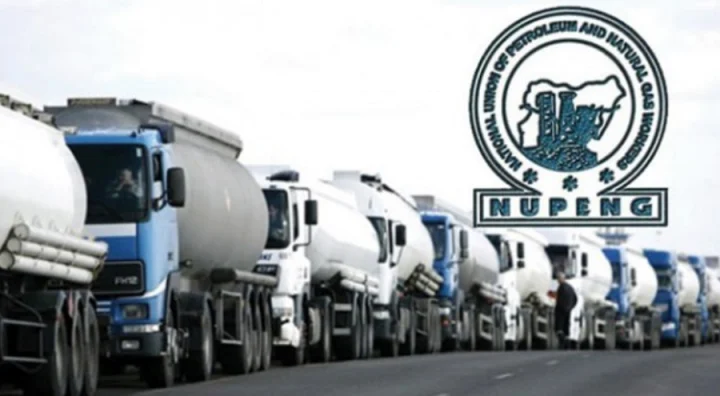The Nigeria Union of Petroleum and Natural Gas Workers (NUPENG) has blocked the loading of fuel from the Dangote Refinery, intensifying a labour dispute over unionisation rights and adherence to recent agreements. The move comes after alleged violations of a deal brokered earlier this month and has raised tensions between tanker drivers, refinery management, and the government.
According to NUPENG, the action began when truck drivers who are members of its Petrol Tanker Drivers (PTD) branch were instructed by Dangote management to remove union stickers from their vehicles. The union claims these drivers had long been affiliated with NUPENG, and the removal of union identifiers directly violated a resolution made in a Memorandum of Understanding (MoU) signed on September 9, 2025.

The MoU, facilitated by the Department of State Services (DSS) and witnessed by multiple federal ministers, required that Dangote Refinery employees who wish to join recognised labour unions be allowed to do so without interference. The agreement also specified that no worker would be victimised for union affiliation, and the unionisation process was to be completed between September 9 and 22.
NUPENG reports that despite the MoU, management directed these long-standing PTD members to remove union stickers, and then ordered them to drive into Dangote Refinery to load fuel. Union officials say they prevented these trucks from gaining access to the refinery gate, citing unfulfilled union loading rules. In NUPENG’s view, the directive undermines the agreement, and thus constitutes a breach of the truce.
The union further alleges that Dangote Group responded by bringing in non-unionised trucks and ordering them to load at the refinery, ignoring union protocols. In addition, NUPENG has claimed that Sayyu Aliu Dantata, a Dangote Logistics director, flew over the blockade by helicopter and called the Navy, allegedly to intimidate union members.
As a result of these events, NUPENG has placed its membership on “red alert,” warning that unless the agreements are respected, the suspended nationwide strike may resume. The union said the violation of the resolution is intolerable and urged solidarity from civil society, other unions, and the federal government to ensure the company upholds its commitments.
Dangote Refinery responded to the allegations with a statement insisting that it remains committed to labour rights. The company denied any enforced removal of union stickers, describing the claims as unfounded. It maintained that employees are free to affiliate with any recognised union and that there has been no refusal to acknowledge such rights. The refinery also asserted that its recent deployment of compressed natural gas (CNG) powered bulk trucks is not intended to displace unionised drivers but to modernise logistics.
Observers say the new standoff highlights a fragile trust between the union and refinery management. Following the earlier MoU, many had hoped for a smooth transition, but the current dispute shows the implementation of agreements remains a major challenge. If unresolved, the conflict threatens to disrupt fuel supply, particularly as Dangote has announced plans to directly supply petrol to several states at new gantry and pump prices starting mid-September.
Economic analysts warn that any fresh strike or prolonged blockade could translate into supply shortages, increased petrol prices, and logistical bottlenecks, especially in states already struggling with high fuel costs. Transporters and retail marketers are particularly vulnerable in such scenarios.
For the labour movement, this confrontation revolves around more than just stickers. It symbolizes a broader struggle over recognition, rights, and the power imbalance between operators and workers in Nigeria’s downstream petroleum sector. Many see it as a litmus test of the government’s ability to enforce labour laws and regulatory commitments in high-profile private sector ventures.
Meanwhile, political and regulatory actors are under pressure to intervene. The Ministry of Labour and Employment, which helped broker the MoU, faces demands from both sides to enforce the terms of the agreement. Civil society observers have also called for transparency, urging all parties to publish the details of the violations and for independent oversight of refinery loading practices.
As of now, loading at the Dangote Refinery remains blocked for many trucks lacking union stickers, and negotiations appear stalled. Both the union and the company have indicated they are monitoring developments, but neither has backed down.
The coming days may determine whether the MoU can still serve as a framework for peace, or if more drastic action—including renewed industrial action—will follow. With fuel supply, union rights, and corporate accountability all in contention, the dispute could well shape labour relations and energy policy in Nigeria’s crucial downstream sector.
Support InfoStride News' Credible Journalism: Only credible journalism can guarantee a fair, accountable and transparent society, including democracy and government. It involves a lot of efforts and money. We need your support. Click here to Donate
